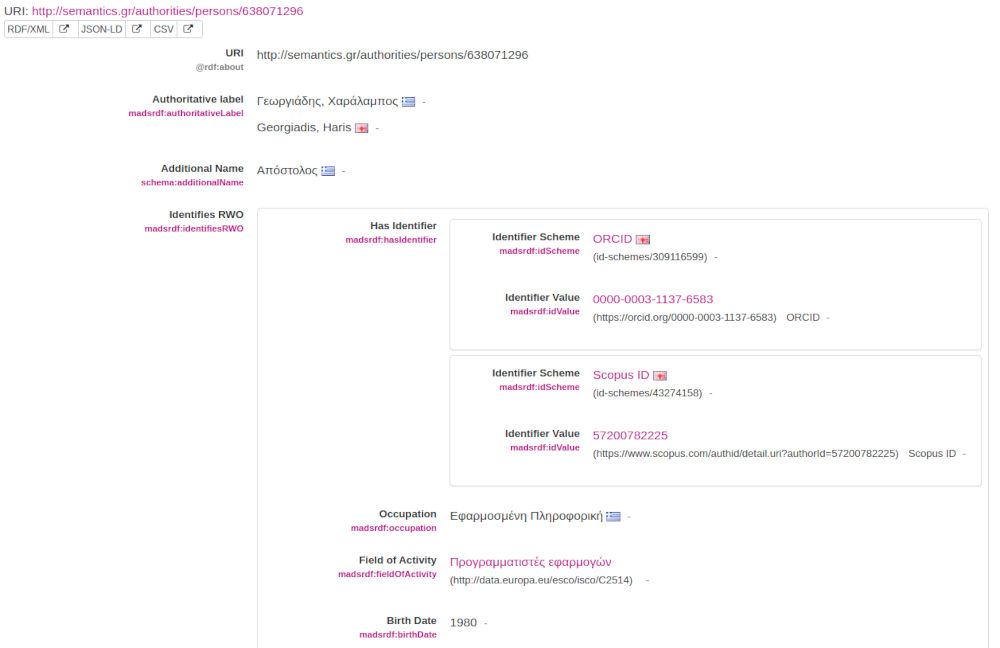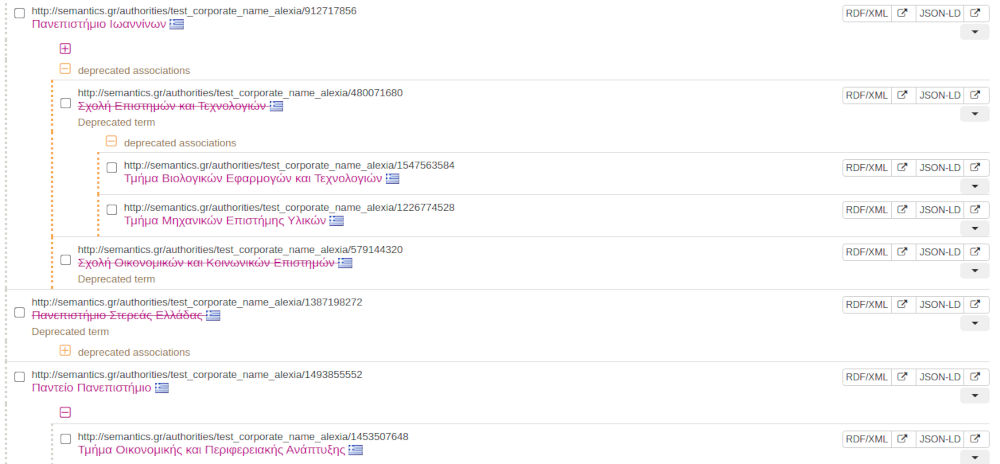Semantics.gr
A Platform for publishing semantic resources as Linked Open Data
Semantics.gr is based on a state-of-the-art infrastructure that underpins the development, curation and interlinking of vocabularies, thesauri, classifications, classification schemes and authority files- altogether called Vocabularies- and their publication as Linked Open Data (LOD). The infrastructure is being developed in-house by the National Documentation Centre in Greece (EKT) in the frame of its mandate and as part of its long-term strategy. The system was initially built for internal purposes; to serve as a central platform where EKT staff members could develop and host the vocabularies they were using in the cataloguing and enrichment processes of EKT’s content services (such as the National PHD theses Archive, the EKT's Institutional Repository, the cultural and scientific data aggregators SearchCulture.gr and OpenArchives.gr, e.t.c.) using semantic knowledge representation technologies.
The novelty of Semantics.gr lies in the fact that, besides SKOS, it can support any Data Model that can be expressed as an OWL ontology. The Data Model chosen in each case generates the template based on which a Vocabulary Schema is created. The Vocabulary Schema in turn, stipulates in detail the structure of the vocabulary that will be created in the infrastructure. In practice, the Vocabulary Schema defines in detail the entry/update form through which the user adds or updates Semantic Resources.
Semantics.gr aspires to serve as a central public platform for publishing trustworthy LOD vocabularies, especially scientific terminology and authority files, that can be further used by any third party in order to enhance the quality and the interoperability of their digital resources.
Semantics.gr is composed of a public platform whereby anyone can freely look up and download individual semantic resources and vocabularies as data dumps.
Authorised users can use Semantics.gr in order to publish their vocabularies in the Semantic Web and/or use the APIs to link to available vocabularies and use them as controlled source vocabularies in the documentation or enrichment processes of their repositories, digital collections and databases. Authorisation is granted to users following an agreement signed between EKT and the legal entity that takes responsibility for the development of a vocabulary. Semantics.gr is addressed primarily at scientific, cultural and public sector organisations that hold and publish digital collections and datasets, without being limited to them.
There are several characteristics that make Semantics.gr a novel service:

A MADS/RDF PersonalName presentation page of a semantic resource

Deprecated entities and relationships in a MADS/RDF CorporateName Vocabulary
Until today there are 48 Vocabularies published in Semantics.gr. These cover different thematic areas and topics such as: cultural item types, historic periods in the Greek territory, thematic tags, scientific domains, etc. Most of these vocabularies have been created by the National Documentation Centre’s staff and by EU-funded projects’ consortia such as the Triple and CatRIS projects. The majority are original Vocabularies while others are adaptations and extensions of existing popular Vocabularies (such as the UNESCO thesaurus, Library of Congress Subject Headings, Library of Congress Classification) with labels translated in Greek. You can browse all published vocabularies here. In the Use Cases page we present the way some of these vocabularies have been used by EKT staff in the documentation and enrichment processes of our repositories and digital collections.
There are a few limitations with regards to the subject matter of the vocabularies that can be hosted in Semantics.gr: Copyright should be respected and we also avoid accepting vocabularies that include personal data of living persons for the moment for GDPR-compliance reasons. Parties developing Vocabularies and using Semantics.gr should be respectful of the ethical principles governing their respective scientific domains. We particularly welcome scientific terminology in any scientific discipline such as archeology, history of art, natural sciences, health, as well as business and public services.
Vocabularies currently hosted in Semantics.gr are grouped around four categories based on their subject:
Semantics.gr started to be developed, in-house, in 2015, by EKT staff. The initial aim was to serve as a platform for hosting the vocabularies that EKT’s scientific staff was developing and using in the documentation and enrichment process of the content services it offers (National PHD Archive, Institutional Repository, etc).
Since 2020, the development of the infrastructure is being funded through the Programme “National Research Information and Technology System: Digital Content Aggregation, Documentation and Dissemination Infrastructure ensuring interoperability, long-term preservation and open access”. The project runs from April 2020 to July 2023 and, among other goals, aims to provide Semantics.gr as a service to third parties and to serve as a central public platform for publishing Vocabularies for the educational community and the public at large.